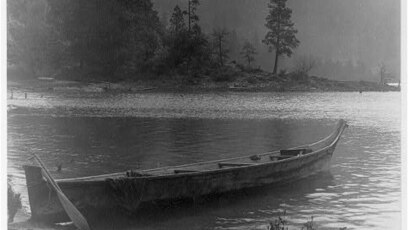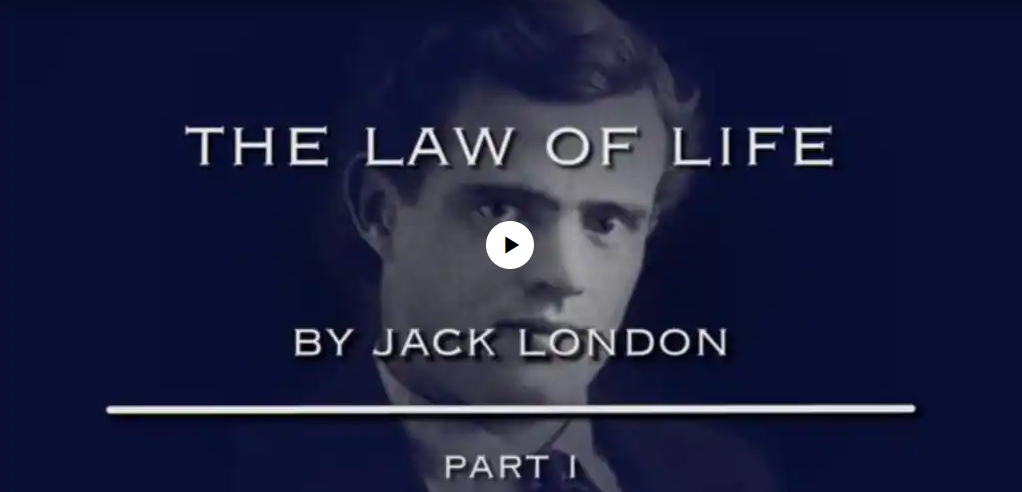We present the first of two parts of the short story “The Law of Life,” by Jack London. The story was originally adapted and recorded by the U.S. Department of State.
Old Koskoosh listened greedily. Although his sight had failed, his hearing remained good. The slightest sound was recognized by a mind yet active behind the aged forehead. Ah! That was Sit-cum-ha shouting curses at the dogs as she beat them into the harnesses. Sit-cum-ha was his daughter’s daughter, but she was too busy to waste a thought upon her old grandfather, sitting alone there in the snow. Camp must be broken. The long trail waited while the short day refused to delay. Life called her, and the duties of life, not death. And he was very close to death now.
The thought frightened the old man for the moment. He stretched forth a shaking hand which wandered over the small pile of dried wood beside him. Reassured that it was indeed there, his hand returned to the shelter of his old, worn furs. He again began to listen. He heard the noise of the half-frozen animal skins being moved. He knew that even then the chief’s moose-skin tent was being packed. The chief was his son, leader of the tribesmen, and a mighty hunter. As the women worked, his voice rose, exclaiming at their slowness. Old Koskoosh strained his ears. It was the last time he would hear that voice. There went Geehow’s tent! And Tusken’s! Seven, eight, nine; only the medicine man’s could yet be standing. There! They were at work upon it now. He could hear the medicine man struggling loudly as he piled it on the sled. A child cried and a woman calmed it with gentle singing. Little Koo-tee, the old man thought. That child was always weeping, and it was sickly. It would die soon, perhaps, and they would burn a hole through the frozen ground and pile rocks above to keep the wolves away. And what difference would it make? A few years at best, and as many an empty stomach as a full one. And in the end, death waited, ever-hungry and hungriest of them all.
What was that? Oh, the men binding the sleds together and drawing tight the ropes. He listened, he who would listen no more. The whips whistled among the dogs. Hear them howl! How they hated the work and the trail through the snow! They had started! Sled after sled moved slowly away into the silent forest. They were gone. They had passed out of his life, and he faced the last bitter hour alone. No. The step of a moccasin broke the snow’s surface. A man stood beside him; upon his head a hand rested gently. His son was good to do this thing. He remembered other old men whose sons had not waited after the tribe had gone. But his son had. The old man’s thoughts wandered away into the past, until the young man’s voice returned him to the present.
“It is well with you?” he asked.
The old man answered, “It is well.”
“There is wood beside you,” the younger man continued, “and the fire burns bright. The morning is gray, and the cold has lessened. It will snow presently. Even now it is snowing.”
“Yes, even now it is snowing.”
“The tribesmen hurry. Their loads are heavy and their stomachs empty with lack of feasting. The trail ahead is long and they travel fast. I go now. It is well?”
“It is well. I am as a last year’s leaf, hanging lightly on a branch. When the first wind blows, I fall. My voice has become like an old woman’s. My eyes no longer show me the way of my feet, and my feet are heavy, and I am tired. It is well.”
He bowed his head in contentment until the last noise of the moccasin on the snow died away. He knew his son was beyond recall. Then his hand moved out from the furs to touch the wood. It alone stood between him and what lay beyond the death that opened before him. Now the measure of his life was a handful of sticks. One by one they would go to feed the fire, and just so, step by step, death would come closer to him. When the last stick had given all of its heat, the frost would begin to gather strength. First his feet would yield, then his hands; and the lack of feeling would travel, slowly, to his body. His head would fall forward upon his knees, and he would rest. It was easy. All men must die.
He did not murmur. It was the law of life, and it was just. He had been born close to the earth and close to the earth had he lived. Its law was not new to him. It was the law of all flesh. Nature was not kindly to the flesh. She had no concern for that single thing called the individual. Her interest lay in the race of man as a whole. He grasped this idea firmly. He saw its truth displayed everywhere. The awakening of life in a tree, the bursting greenness of its branches, the fall of the yellow leaf—in this alone was told the whole history. But one task nature did give the individual. Did he not perform it, he died. Did he perform it, it was all the same—he died. Nature did not care; there were plenty who would obey. It was only the need that this duty be obeyed, not the man who obeyed it, which lived and lived always. The tribe of Koskoosh was very old. The old men he had known when he was a boy had known old men before them. Therefore, it was true that the tribe lived, that it represented the obeying of all its members, whose final resting places were unremembered. They were not important; they were chapters in life’s story. They had passed away like clouds from a summer sky. He also would pass away. Nature did not care. To life she gave one task and one law. To continue the race was the task of life; its law was death. A young girl was a good creature to look upon, full-breasted and strong, with a lightness to her step and a shine in her eyes. But her task was yet before her. The light in her eyes brightened and her step quickened. She laughed with the young men, then she turned away. She passed on to them her own unrest. And she grew fairer and yet fairer to look upon. Finally, some hunter took her to his tent to cook and work for him and to become the mother of his children. And with the coming of her children her beauty left her. She dragged her legs and arms when she walked. Her eyes lost their brightness. Then only the little ones found joy in the old, lined face. Her task was done. In a little while, in the first famine or in the first long trail, she would be left, as he had been left, in the snow, with a little pile of wood. Such was the law.
He placed a stick carefully on the fire and returned to his thoughts. It was the same everywhere, with all things. The insects disappeared with the first frost. When age settled upon the rabbit it became slow and heavy and could no longer run faster than its enemies. Even the big bear grew old and blind, to be dragged down at last by a small group of barking sled dogs. He remembered how he had left his own father along the Klondike River one winter. It was the winter before the missionary came with his books and his box of medicines. Many times Koskoosh had recalled with pleasure the taste of those medicines. The one called “painkiller” was especially good. But now his mouth refused to moisten. He remembered that the missionary had become a worry to them. He brought no meat into the camp, and he ate much. The hunters did not like this. Then when they were near the Mayo, he became ill. And afterward, the dogs pushed the stones away and fought for his bones.
Now it’s your turn to use the words in this story. What is the best way to treat people who are old and sick? Let us know in the comments section or on WWW.VOA-STORY.COM
________________________________________________________________
Quiz – The Law of Life, Part One

Start the Quiz to find out
______________________________________________________________
Words in This Story
greedily – adv. in a way that shows a selfish desire to have more of something
harness(es) – n. a set of straps placed on an animal so it can pull something heavy
trail – n. a path through a forest or field
wander(ed) – v. to move around or go to different places usually without having a particular purpose or direction
pile – n. a group of things that are put one on top of another
reassure(ed) – v. to make someone feel less afraid, upset or doubtful
tent – n. a portable shelter that is used outdoors, is made of cloth and leather, and is held up with poles and ropes
strain(ed) – v. to try very hard to do or get something
medicine man – n. among North American Indians and some other peoples, a person believed to have magical powers of healing and of seeing into the future; a shaman
pile(d) – v. to put something in a pile
sled – n. a small vehicle that has a flat bottom or long, narrow strips of metal or wood on the bottom and that is used for moving over snow or ice
weep(ing) – v. to cry because you are very sad or are feeling some other strong emotion
bind(ing) – v. to tie or wrap something with a rope or string
bitter – adj. causing painful emotions
moccasin – n. a flat shoe that is made of soft leather and is similar to a shoe originally worn by some Native Americans
feasting – n. (gerund) the act of eating large amounts of food
branch – n. a part of a tree that grows out from the trunk
bow(ed) – v. to bend forward at the neck or waist as a formal way of greeting someone or showing respect
contentment – n. the state of being happy and satisfied
murmur – v. a quiet expression of an opinion or feeling
grasp(ed) – v. to understand something that is complicated or difficult
drag(ed) – v. to force yourself to move or to go to a place when you are tired, busy, etc.
famine – n. a situation in which many people do not have enough food to eat
rabbit – n. a small animal that usually lives in holes in the ground and has long ears, soft fur, and back legs that are longer than its front legs
bear – n. any one of a group of large and heavy animals that have thick hair and sharp claws and that can stand on two legs like a person
barking – n. (gerund) the act of making the short, loud sound a dog makes
missionary – n. a person who is sent to a foreign country to do religious work, such as to convince people to join a religion or to help people who are sick or poor
moisten – v. to become slightly wet
